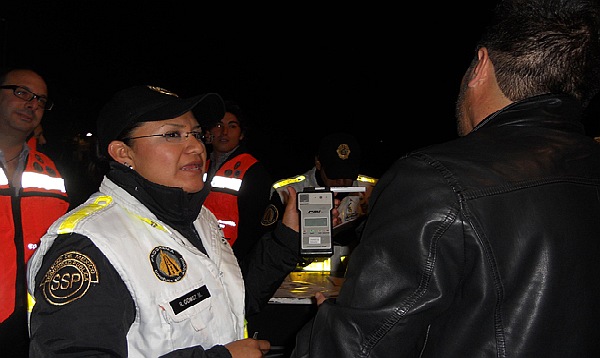Mexico City, Mexico – Safer streets. That’s been the result of the "Conduce Sin Alcohol," or Drive Without Alcohol, program which has led to a 70 percent decrease in the number of alcohol-related traffic accidents in Mexico City.
In 2003, the year the program began, there were 160 deaths among 315 alcohol-related accidents. But from January to October 2012, there were 60 deaths from 93 alcohol-related accidents, said Faustino Gómez Lira, director of the Conduce Sin Alcohol Program.
The program, through which drivers are subject to interviews and breathalyzer tests at mobile checkpoints, was created due to the high number of people who were being killed in traffic accidents caused by drunk drivers.
"The breathalyzer is meant to disseminate and promote road safety to lower the rate and frequency of injuries, accidents, and deaths caused by drivers under the influence of alcohol," Gómez Lira said.
The program operates every weekend between 10 pm and 5 am, with 15 mobile checkpoints throughout the city. In addition, there are five daytime checkpoints exclusively for public transportation drivers.
The program rotates the checkpoints throughout the night, which improves coverage, according to Oscar Pérez Coria, the operational director of the program.
"The checkpoints are relocated two or three times a night, covering 45 to 60 different locations over a wider area in various parts of the city," he said.
About 150 technicians work nightly, checking drivers to make sure they are not inebriated. The signs may include the smell of alcohol on a driver’s breath, problems responding to questions, uncoordinated eye movement, empty stares, and other impairments.
"Once those symptoms have been detected, they can be tested," Pérez Coria said. "They are asked to step out of the vehicle and blow into the breathalyzer."
Drivers whose blood alcohol level exceeds 0.40 milligrams are detained for 20 to 36 hours at the Administrative Sanctions Center, receive a court date, pay a fine for their impounded vehicle to be released and have their driver’s license suspended for a year, Pérez Coria said.
There were 570,000 interviews, 102,000 breathalyzer tests, 14,000 arrests and 8,883 impounded vehicles in Mexico City from January through October, according to the Ministry of Public Safety.
Since the program’s inception in 2003, 88,000 people have been arrested, but there’s been a decline in apprehensions, as 19,101 were arrested for driving under the influence of alcohol in 2011 after about 25,000 were booked in 2010.
During the holiday season, the Conduce Sin Alcohol Program installed 20 fixed 24-hour checkpoints on streets, highway access points, and bus terminals in Mexico City.
The program also has a component known as "Punto Amigable," or Friendly Point, which involves visits to schools, companies, and bus stops to explain how the breathalyzer works, conduct voluntary exams, and distribute informative materials.
"We want people to begin to see the program as part of a comprehensive road safety program to ensure every citizen has a right to return home safely," Gómez Lira said.
Support from Non-Governmental Organizations (NGO)
Conduce Sin Alcohol has achieved greater social credibility thanks to collaboration from civic organizations that provide training and supervision to ensure the program performs its purpose.
For example, the Social Research Foundation (FISAC) trains officers involved in the checkpoints and distributes information about the program.
"FISAC actively collaborates with the Public Security Secretariat through the Interactive Health Promotion Workshops (TIPS,) which have trained all of the officers that operate the checkpoints," said Fabiola Torres, the director of Communications and Strategy at FISAC. "We have also distributed 183,000 leaflets to drivers since 2011."
The NGO "Convivencia Sin Violencia," or Coexistence without Violence, provides citizen observers to ensure no corruption or abuse of drivers occurs.
"We have seen cases involving politicians, artists, politicians, professional athletes, and nobody has gotten off, said Convivencia Sin Violencia Director Joaquín Quintana. "It’s an exemplary program that functions with zero impunity. Everything is transparent and that has been one of its major successes."


